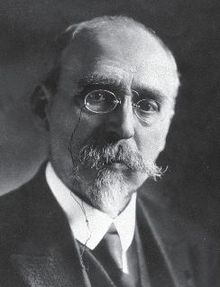Ferdinand Buisson
Ferdinand Édouard Buisson (born December 20, 1841 in Paris , † February 16, 1932 in Thieuloy-Saint-Antoine , Département Oise ) was a French educator and politician. As a champion of the League of Nations idea , co-founder and long-time chairman of the French League for Human Rights, he received the Nobel Peace Prize in 1927 with Ludwig Quidde .
life and work
Ferdinand Buisson was born in 1841, his father was an examining magistrate in Paris. He attended high school in Saint-Etienne and then studied philosophy at the Sorbonne in Paris . In 1868 he finished his studies, but received due to his refusal to oath of allegiance to Napoléon III. no job in France and went to Neuchâtel in Switzerland as a teacher . Here he took part in the Geneva Peace Congress in 1867, at which the International League for Peace and Freedom was founded.
In 1870, after the fall of Napoleon III, Buisson returned to France and, thanks to his friendship with the Minister of Education, Jules Simon, became head of the school system in Paris. However, he had to resign from this position after a short time due to his open criticism of the church. Under the successor Simons Jules Ferry , the school system was reformed in 1879 and this put Buisson in the position of general inspector for education, in which he worked for 17 years and published several books. From 1896 to 1906 he was a professor at the Sorbonne and editor of a dictionary of pedagogy . From 1902 to 1914 and from 1919 to 1923 Buisson was elected as a member of the Parti radical in the French parliament.
In addition to his work, Buisson was always associated with the peace movement and campaigned for human and civil rights . He also advocated the resumption of the Alfred Dreyfus trial , known as the Dreyfus affair . From 1913 to 1926 Buisson was president of the French League for Human Rights , which after its founding campaigned for the discharge of Dreyfus. In this function, Buisson spoke primarily for the rights of persecuted minorities. Especially during the First World War , his position for the observance of human rights became popular even in times of war, which he vehemently demanded. He strongly criticized the Versailles Treaty , the League of Nations , on the other hand, despite some criticisms in his eyes, was an opportunity for international peace work. In 1924, Buisson spoke out in favor of Franco-German reconciliation before the German Reichstag and accompanied the speech with a “peace trip” through Germany. In 1927 he received the Nobel Peace Prize together with the German pacifist Ludwig Quidde.
In Berlin-French Buchholz , the street 49 was renamed after him, into which the Ludwig-Quidde-Straße (former street 64) flows, so that they are symbolically united after their death.
Works
- Condorcet . Alcan, Paris 1929
- Dictionnaire de pédagogie et d'instruction primaire . Alcan, Paris 1929
- Education et Republique . Kimé, Paris 2003, ISBN 2-84174-293-8
literature
- Patrick Dubois: Le dictionnaire de Ferdinand Buisson . Lang, Bern 2002, ISBN 3-906768-10-4
- Laurence Loeffel: Ferdinand Buisson . Hachette, Paris 1999, ISBN 2-01170595-9
- Bernhard Kupfer: Lexicon of Nobel Prize Winners . Patmos Verlag, Düsseldorf 2001
Web links
- Olivier Fatio / AW: Buisson, Ferdinand. In: Historical Lexicon of Switzerland .
- Publications by and about Ferdinand Buisson in the Helveticat catalog of the Swiss National Library
- Literature by and about Ferdinand Buisson in the catalog of the German National Library
- Information from the Nobel Foundation on the award ceremony for Ferdinand Buisson in 1927 (English)
- Extraits du Dictionnaire Pédagogique d'Instruction Primaire
Individual evidence
- ↑ encyclopedia team of the publisher FABrockhaus (ed.): Nobel Prizes . Chronicle of outstanding achievements. Mannheim 2001, ISBN 3-7653-0491-3 , pp. 276 .
| personal data | |
|---|---|
| SURNAME | Buisson, Ferdinand |
| ALTERNATIVE NAMES | Buisson, Ferdinand Edouard (full name) |
| BRIEF DESCRIPTION | French educator |
| DATE OF BIRTH | December 20, 1841 |
| PLACE OF BIRTH | Paris |
| DATE OF DEATH | February 16, 1932 |
| Place of death | Thieuloy-Saint-Antoine |
